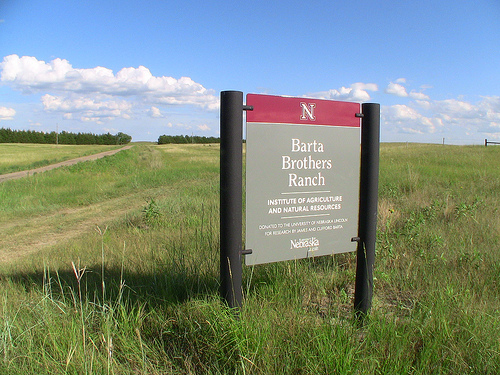
The difference between a good university and a great university can be measured by the passion, vision and generosity of its donors. Clifford and Jimmie Barta were brothers that ranched their entire lives in the eastern Sandhills of Rock and Brown Counties. During their estate planning, they chose to gift their ranch (Barta Brothers Ranch [BBR]) to the University of Nebraska–Lincoln. Neither had attended the University, but both felt a tie to it like so many Nebraskans. It was very similar to the tie that they enjoyed with the land. They really only asked for two things in gifting the ranch: care for the land and all its creatures as they had cared for it and to have BBR serve as a model ranch for the local community, Nebraska’s future ranchers, and generations to come – now and forever.
The Barta Brothers’ wisdom, ecological insight and masterful application of what is now referred to as holistic or systems-based management set the example of what could be. They, with the land, became one. And they chose to entrust their living legacy with the University to share with future generations of Nebraskans and the global community. The BBR is located about 20 miles south of Long Pine in Rock and Brown Counties. The property was acquired from Jimmie and Clifford Barta in 1996 and is about 6,000 acres with over 5,500 acres of upland range. There are roughly 120 acres of contiguous sub-irrigated meadow and over 100 acres of discontinuous sub-irrigated meadow and wetland scattered over the ranch. Facilities on the 35 acre building site consist of a headquarters building with dormitory type living arrangements, a lab building, and large outbuilding.
The Barta Brothers envisioned a model ranch with the facilities and support needed to conduct production-scale research and demonstrations. Educational programs were essential in training students and continuing education for ranchers, conservationists, and representatives of federal and state agencies. Research and demonstrations were to focus on long-term grazing management systems and the biotic and abiotic factors associated with such Sandhills systems.
The BBR is ideally suited for research on grazing as well as ecosystem structure and function in the Sandhills. The rangeland at BBR is in good to excellent condition and is similar to most upland range in the eastern half of the Sandhills. It is an excellent demonstration site for ranchers in this area and is readily accessible by University students and the public. Current research projects honoring the vision of the Barta brothers focus on plant and livestock response to grazing systems include:
- Long term aboveground production of upland rangeland (1999-2018);
- Comparison of upland grazing systems (1999-2008);
- Sandhills biocomplexity: integrating biogeophysical processes across space and time (2003-present);
- What are ecosystem responses to ultrahigh stocking density (mob grazing) on Sandhills meadows (2010-2018); and
- Interacting effects of grazing period length and stocking rate on vegetation and soil responses on Sandhills uplands (2010-2018).
The long-term research needed to address the current and future challenges continues. A new project is proposed to start in 2020 with faculty from the Department of Agronomy and Horticulture and the School of Natural Resources in collaboration with the Nature Conservancy and the Nebraska Game and Parks Commission. This long-term research will investigate the ecological and agricultural impact of vegetation structure in upland pastures that are conventionally managed. It will add to the rich portfolio of producer workshops, publications, presentations, extension activities, grants, thesis and dissertations that define the impact of the BBR.
The BBR is just beginning its journey to fulfill the vision of Jimmie and Clifford. This is the power of a gift that makes a difference every day in perpetuity. Our prairie heritage is defined by the stewards who have cared for our grasslands, learned from them, and passed the knowledge forward to those who will sustain its future.
More information can be found on the Barta Brothers Ranch webpage.
Steven Waller, Interim Director, Center for Grassland Studies
More details at: https://grassland.unl.edu/